
Site
The design of the resort reimagines the grandeur and splendor of a distant era, transporting guests back in time. Perched on a spur of the Aravalli, the 6-acre historic fort faces the Chauth ka Barwara temple. Within its fortified walls, two palaces and two temples stand as reminders of a rich legacy. The fort was once surrounded by subtropical dry deciduous forests that were then the hunting grounds for the Barwara royal family. Over the years, the landscape has undergone a stark transformation resulting into an arid and barren landscape. Over-exploitation resulted in the near disappearance of these forests, leaving the lake vulnerable to the impacts of a degraded catchment.
Design Brief and Concept
The vision for this project was to create a 48-suite luxury hotel, with the landscape design encompassing a range of public spaces such as arrival areas, the spa, pool, courtyards, gardens, and event spaces, extending to the private courtyards of the suites. The strategy involved both the adaptive reuse of four historic structures and the construction of a new guest suite block and ancillary buildings.
In the realm of luxury hospitality, landscapes often adopt a static state of perpetual lushness throughout the year. This tendency typically manifests in meticulously manicured settings, heavily reliant on water and dominated by exotic plants. The project challenges this conventional notion of luxury. Embracing native flora, showcasing indigenous materials, honoring local crafts and customs, and working within the constraints of the site’s resources, the endeavor aims to redefine the concept of opulent landscapes. This project was an opportunity for the design team to redefine this paradigm of luxury. It aspires to shift the idea of luxurious landscapes from manicured to responsive, exotic to ecologically appropriate, and static to dynamic.
The Water Narrative
This story is from the {{IssueName}} edition of {{MagazineName}}.
Start your 7-day Magzter GOLD free trial to access thousands of curated premium stories, and 9,000+ magazines and newspapers.
Already a subscriber ? Sign In
This story is from the {{IssueName}} edition of {{MagazineName}}.
Start your 7-day Magzter GOLD free trial to access thousands of curated premium stories, and 9,000+ magazines and newspapers.
Already a subscriber? Sign In
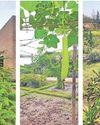
PLANTING IN URBAN AREAS NOTES
In urban landscapes, while balancing aesthetic design with their ecological functions, the understanding of plants in respect of their ecozones*, microhabitats, and species plays a crucial role. Native plants offer ecological benefits but face challenges in urban environments. There are some pragmatic considerations in this regard.
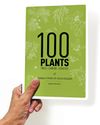
PLANTS IN ECOLOGY AND DESIGN
'100 Plants' offers insight into Delhi's ecology, guiding landscape architects and gardeners to cultivate sustainable, bio-diverse urban landscapes. It is an essential resource for all plant enthusiasts.
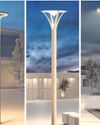
LANDSCAPE LUMINAIRES CAPTURING THE ESSENCE OF LANDSCAPES
Landscape luminaires blend with architecture, enhancing safety, security, accentuation, and aesthetics while minimizing light pollution and promoting sustainability for a captivating outdoor experience.
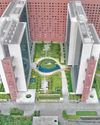
SURAT DIAMOND BOURSE
The landscape design of the corporate-commercial centre, inspired by the five elements of nature and Vastu principles, attempts to create a unique sense of place. It combines design with public art, encouraging a harmonious environment for business and leisure.
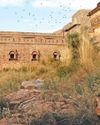
SIX SENSES FORT BARWARA RAJASTHAN
In the transformation of a historic 14th century fort-an erstwhile home of a Rajasthan royal family-into a luxury resort, native plants and indigenous materials play a pivotal role, redefining luxury with ecological sensitivity.
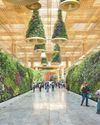
'A TERMINAL IN A GARDEN' PUTTING NATURE AND BIODIVERSITY AT THE HEART OF THE PASSENGER EXPERIENCE
The design of Terminal 2 (T2) at Kempegowda International Airport in Bengaluru is an attempt to provide a sensory and biophilic experience for passengers.
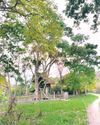
IDEAS OF 'SCENERY' AND 'LANDSCAPE' LINKING GEOGRAPHY WITH LANDSCAPE ARCHITECTURE
The term ‘landscape’ while encompassing natural and human elements, is understood differently among disciplines. Geographers, another set of experts working closely with nature, provide crucial ecological data, aiding landscape architects in creating sustainable designs.
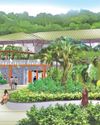
THRISSUR ZOOLOGICAL PARK KERALA
The relocated Zoo aims to showcase rich Western Ghats ecosystems, support nature conservation, and provide immersive visitor experience. The development integrates ecological restoration, architecture and landscape while improving livelihood opportunities of the local community.

ECOLOGY AND LOCAL CULTURE
With a working panel of scientists and experts from different fields of plant and animal ecology, the Nature Conservation Foundation is a Mysore-based NGO, engaged in exploring, understanding, and conserving the natural world through research and responsible engagement with society.
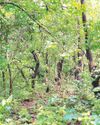
BEAUTY FOLLOWS COMPLEXITY
Designers must heed Sullivan's \"form follows function\" to avoid beauty over function. Following nature in landscape design enhances ecological productivity while promoting sustainability with principles of use of native species, biodiversity, and conservation of natural resources.